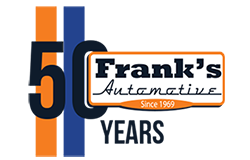-
Harmonic Balancer Separation 101
The harmonic balancer is one of the most crucial parts of your vehicle’s crankshaft. As your engine turns, the harmonic balancer absorbs its vibrations and provides you with a smoother and more enjoyable ride. If your harmonic balancer is damaged or broken, you will need to make an appointment for car repair in Sacramento. A German auto repair facility will have the tools needed to get your harmonic balancer up and running properly.
One of the most serious issues that can occur in a harmonic balancer is when the unit separates from the engine belts. When your harmonic balancer separates, it is in danger of falling out of the crankshaft. To prevent catastrophic damage to your engine, you will need to schedule an immediate appointment at your auto shop . Using special tools, your mechanic will be able to rejoin the harmonic balancer to the belts and restore your car’s crankshaft to proper function.
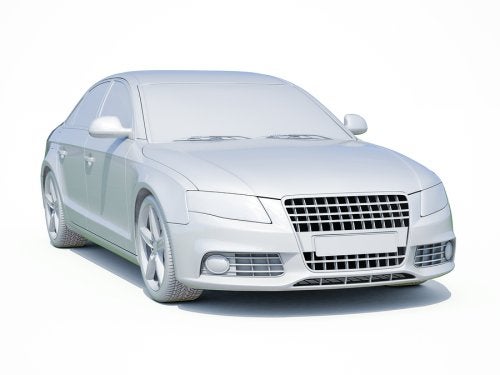
-
Three Common Symptoms of a Problem with Your Braking System
When your car is in need of brake repair , it can be very dangerous to neglect scheduling a service appointment for your vehicle. As your car’s sole source of stopping power, your brakes allow you to keep your car under control as you drive down the road. To avoid a dangerous situation behind the wheel, you will want to schedule brake repairs in Sacramento as soon as you notice the signs of a problem. To help you know when it is time to schedule brake repair, here is an overview of three symptoms that something could be going wrong with your car’s braking system.
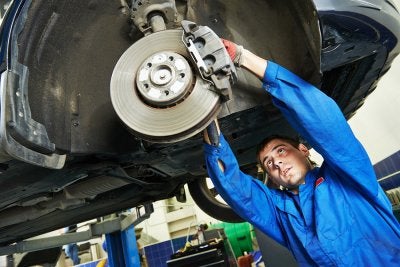
Brakes are the sole source of stopping power for your vehicle, so it is important when your vehicle is in need of brake repair not to neglect scheduling an appointment in Sacramento as soon as possible. To help you know when it is time to schedule brake repair, here is an overview of three symptoms that something could be is going wrong with your car’s braking system.
Strange Sounds
To assess the safety and condition of your car’s brakes, you’ll want to use your ears. Many times, your brakes will start to make strange sounds when they are starting to develop mechanical troubles. Squealing noises, for instance, can indicate worn out brake pads. More serious noises include grinding or grating sounds, which may be signs of worn out brake pads & rotor/discs.
Soft Brake Pedal
As you get to know the ins and outs of your car’s typical performance dynamics, you will grow accustomed to its typical brake feel. In the event that your vehicle is experiencing braking issues, you may start to feel that your brake pedal is excessively soft or mushy. A soft brake pedal can be caused by low brake fluid, or brake lines that have started to leak. To avoid issues in your master cylinder as well as potential dangers on the road, you will want to have your soft brake pedal fixed as soon as you can.
Shaking Sensations
Over time, your brakes may start to create unusual sensations when you hit the brake pedal. If your brake rotors have gotten warped due to damage or neglect, they may start to shake and shudder whenever you apply pressure to the brakes. To address any concerns that you may have about your car’s braking system, be sure to make an appointment with a brake repair specialist in your area.
-
When is the Work Done?
We get a lot of calls from clients asking if we can “clear codes”, “perform software updates”, “resetting service indicators”, “re-adapt”, or “program components”. They had another shop install parts but they didn’t have the right tools or knowledge to complete the work . So I ask you,“Does it sound like that shop completed the work?“
That is why it is important to check on who is working on your vehicle, verifying they have the equipment and capabilities to complete the work. Anyone can replace parts but the proper tools and knowledge is needed to complete the work. They may be able to give you a very low quote for replacing parts, but they are only doing half the job. You can go to a restaurant and order a meal but what would you say if they brought you a plate of raw food and told you they didn’t have the tools to cook it? That would be unacceptable. Looking at it that way, do you think it would be acceptable to leave service indicators lit, check engine lights on, or your vehicle not running properly?
At Frank’s Automotive , when we quote a price, that quote is for installing components and performing the necessary actions to Complete The Job . Also, a very important part of completing the work is standing behind the work we do. That is why we give you a 2-year unlimited mileage warranty. We want you to know that we are here to take care of you.
So next time you call for a quote ask not only for a price but verify that they can…
Complete the Work!
-
Driving Habits That Could Be Damaging Your Transmission
Transmission repair is vital for maintaining the performance and integrity of your vehicle. By scheduling regular transmission repair for your automatic transmission, you can make sure that your vehicle runs smoothly for every mile that you drive. With services from a transmission shop in Sacramento, you will be able to address any issues that are troubling your car’s transmission system. Between transmission repair appointments, there are a few steps that you can take on your own that will help to preserve your transmission. Let’s review some common driving habits that could be causing damage to your transmission.
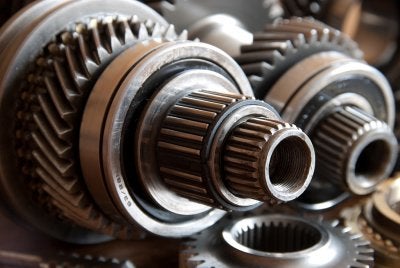
Rapid Acceleration
In order to allow your vehicle to accelerate quickly, your transmission must quickly shift through many of its internal gears. If you are the type of driver that prefers to accelerate quickly through traffic, you may be causing damage to your car’s transmission. In order to ensure that your transmission is able to last for as long as possible, it is a good idea to drive smoothly and without sudden spurts of acceleration. Also a key thing to remember, allow your vehicle to come to a complete stop before you switch between forward & reverse gears. That rapid transition could be damaging.
Leaving Your Foot on the Clutch
Drivers of manual transmissions will have additional considerations when it comes to their driving habits. One common habit that could be hurting your transmission is a tendency to leave your foot on the clutch. If you neglect to take your foot off of the clutch between shifting, you may be keeping your clutch in constant engagement. Over time, this habit may cause your clutch to wear prematurely.
Driving Up Steep Hills
If you want to make sure that your transmission lasts for as long as possible, you may need to adjust the routes that you drive every day. Driving up and down very steep, hilly terrain can place excess wear and strain on your vehicle’s transmission. By choosing the flattest route possible, you can ensure that your transmission lasts for the lifespan of your car. Your mechanic can provide you with additional tips and information about how to care for your transmission.
-
A Look at the Components of Brakes
Learning about your car’s internal systems can help you determine when it is time to visit the auto repair shop. Brakes are among the most critical safety systems in any vehicle. When your brakes and rotors start to wear out, your car’s stopping ability could be seriously compromised. By setting up brake service in Sacramento when you start to notice a problem with your braking system, you can prevent further damage to your vehicle. If you are interested in gathering information about how brakes work, read on to learn more about the different components of your car’s brakes.
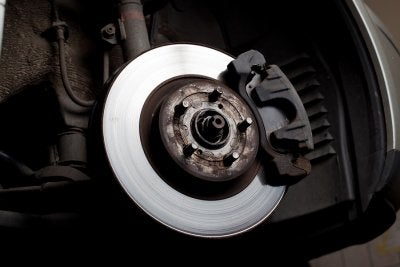
Master Cylinder
The master cylinder is responsible for powering the entire braking system. When the driver places pressure on the brake pedal, this will signal the master cylinder to send hydraulic fluid through the brake lines. The hydraulic power will activate the brakes pistons and cause the vehicle to slow or stop.
Brake Lines
A car’s brake lines are designed to transport brake fluid throughout the braking system. The master cylinder is connected to the other parts of the braking system through a series of brake lines. If the brake lines become damaged, a car may start to leak brake fluid.
Brake Caliper
The brake caliper is designed to house all of the different mechanical components of a braking system. Inside the brake caliper, you will find the brake piston, brake pads, and brake rotors. If a car is experiencing braking problems, the technician may need to disassemble the brake caliper in order to repair the issue.
Brake Pads
A brake pad replacement is one of the most common brake repair services that any car owner will need to schedule. The brake pads are designed to grip the brake rotors, causing the vehicle to slow down or stop. Since the brake pads receive a high degree of friction, they will wear down more quickly than any other brake component.
Brake Rotors
The brake rotors are directly connected to the wheels of a car. As pressure is placed on the brake pads, the brake rotors will stop the rotation of the wheels.
-
How Long Do Brake Pads Last?
When you bring your vehicle in for brake repair, your mechanic may recommend that you replace your brake pads. Since your brake pads absorb the majority of the friction that is created when you hit the brakes, they will need to be replaced at regular intervals. While there is no hard and fast number for the lifespan of a brake pad, you can generally expect your pads to last for around 30,000 to 70,000 miles. A shop that offers brake pad replacement near Sacramento can help you decide when it is time to schedule brake services for your car.
There are several signs that your brake pads have reached the end of their lifespan. When it is time to replace your brake pads , you may start to hear a loud squealing noise coming from your brakes. This sound is an indication that your brake pads have worn down too far, and are in need of immediate replacement.
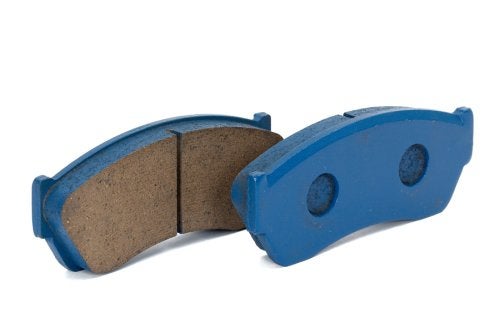
-
What Do Different Brake Sounds Mean?
You don’t have to be a mechanic to know when something is wrong with your car. You drive it every day, which means you’ll notice when something is wrong based on how it feels or sounds. For instance, you may notice unusual sounds when you apply the brakes. There are a number of issues that can cause unusual brake noises, and depending on the type of noise you are hearing you might be able to troubleshoot or diagnose the problem before it gets any worse. If you hear any of these noises, visit a brake repair shop in Sacramento .

Screeching
High-pitched noises, usually of the screeching or squealing variety, usually indicate that your brake pads are worn down and need to be replaced. Modern brake pads are equipped with wear indicators that emit a high-pitched squeal when the pad has worn down to the point where it needs to be changed. In rare cases, these noises can also indicate broken anti-rattle clips or worn-out brake pad insulation. In any case, have your brakes looked at as soon as you hear this noise.
Rattling
Brake rattle is most often heard when you let up off the pedal, and it usually sounds like someone shaking a can of spray paint. Although brake rattle can happen because of expansion of the brake pads due to heat, this rattle should not be consistent and should never occur while you have your foot on the brake pedal. Under either of these conditions, bring your car to a brake repair shop to make sure it’s not a more serious problem.
Grinding
You know that screeching sound you’ve been ignoring for the past three months? By now it’s probably a grinding sound, and that’s bad news for your brakes and your wallet. In most cases, this noise is heard when brake pads wear out completely and cause the steel backing of the worn-out pad to grind against the brake rotor. If you hear a grinding noise, get your car to an auto repair shop in Sacramento ASAP to avoid expensive repair costs.
RECENT POSTS
categories
- Uncategorized
- Automotive
- automotive diagnostics services
- Frank’s Automotive
- auto shop
- oil change
- Auto mechanic
- Maintenance
- maintenance schedule
- Catalytic Converter
- Engine Light
- oxygen sensor
- Transmission Problems
- BMW
- Pre-Purchase
- Brakes
- Anti-Lock Brakes
- Auto Diagnostics
- Alternator Repair
- Slipping Transmission
- Engine Trouble
- Brake Sounds
- Frank’s Automotive
- Frank Lettini
Archives
2022
2020
2019
2017
2016
- December (4)
- November (5)
- October (4)
- September (4)
- August (4)
- July (4)
- June (4)
- May (4)
- April (4)
- March (4)
- February (4)
